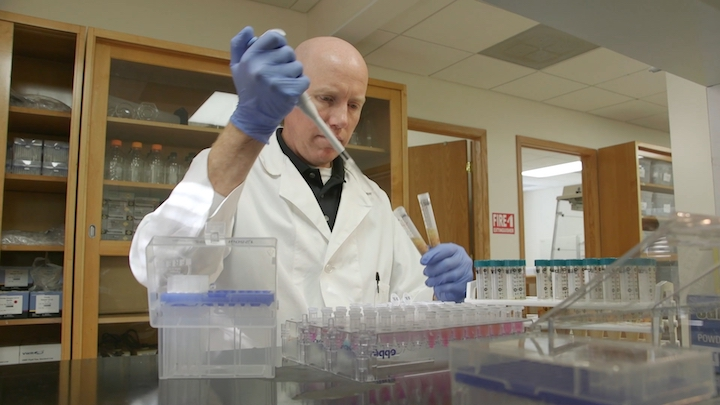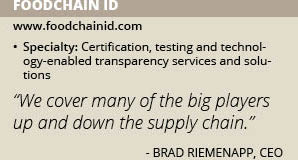
FoodChain ID
FoodChain ID provides transparency to food companies while ensuring safety and sustainability.
When people eat, they like to do it knowing where their food came from, what it was made with, and if it was grown and raised sustainably. FoodChain ID helps food, feed and agricultural companies give them those feelings of transparency and assurance.
Based in Fairfield, Iowa, FoodChain ID provides certification, testing and technology-enabled transparency services and solutions. CEO Brad Riemenapp notes that the company started operations in 1996 as a GMO identification business.
But over the last two decades, its range of services has grown to meet the increasing demand for transparency, accountability, safety and sustainability. Today, “We do food safety certifications and sustainability certifications and verifications,” he reports. These not only include non-GMO Project verification, but also USDA organic certification, and BRC and SQF food certifications, among many others.
Its reach also has grown outside the United States, with locations in Mexico, Brazil, Germany, the United Kingdom, Serbia, Italy, Belgium, Romania, Thailand and India. “We’ve become a much more globalized company, and it all initiated back here in Fairfield,” Riemenapp says.
 FoodChain ID serves a client base of 30,000 food companies, including a good portion of the top-50 food companies in the world. “We definitely cover many of the big players up and down the supply chain,” he says.
FoodChain ID serves a client base of 30,000 food companies, including a good portion of the top-50 food companies in the world. “We definitely cover many of the big players up and down the supply chain,” he says.
But innovation is a goal for modestly sized firms as well, as they also aim to be sustainable and transparent. “There’s a lot of small companies that are doing interesting work and they come to third-party providers like us,” he says. “[Our base] literally spans the spectrum of the food supply chain.”
Global Head of Sustainability Programs David Gould agrees. “We have hardcore organic production chains and mainstream, multinational companies selling large volume commodities across the globe,” he describes. “We also have anything and everything in between.”
Customer-Driven
FoodChain ID operates with the mission of being a proactive, customer-centric company. “Whether you’re talking to a poultry producer or someone who manufactures a dietary supplement, they have unique requirements to accomplish certification to satisfy a variety of market demands, provide transparency, and improve their own internal operation’s performance,” Riemenapp says.
The company meets those needs by providing customized, reactive services through its technology, which “lets us be more be more efficient with the kinds of information we need to process,” Gould says. “It helps us be able to track every ingredient and every activity that’s going on in the supply chain.”
But the human factor is critical as well, as clients depend on FoodChain ID’s staff to be flexible and accommodating to their needs. “That human touch is really what keeps people with us,” he says.
With both, FoodChain ID can meet the demands of what the company refers to as “the New Food Economy.” These new conditions of the market, Riemenapp explains, include increased consumer expectations for transparency when it comes to what they eat.
“With social media and the availability of information, people are more aware,” he describes. “They’re looking for more transparency about what the ingredients are, where food comes from, and how that company stands on social matters.”
Regulators also are experiencing more pressure from consumers to keep the food supply chain safe. “The convergence of those three things – consumer transparency demands, supply chain functionality, and regulations – [are] what continue to propel us forward,” he says.
All in One
FoodChain ID’s recent acquisition of one of Italy’s leading organic certifiers, Bioagricert, has allowed the company to provide bundled services to its clients. “We were very excited about bringing that asset into our company,” Riemenapp recalls.
In research, he explains, FoodChain ID learned that nearly 50 percent of the customers who used its non-GMO Project verification also needed organic certification services. “Previously, they had to go to two separate companies to do that,” he says.
Now they can turn to FoodChain ID for both, while also relying on the company’s extensive expertise about their businesses and its proprietary supply chain technology. “By working with them through our systems, we know quite a bit about their supply chain,” Riemenapp says. “We know what products they make and produce, and what ingredients go into those products.”
With that knowledge and enabling technology, FoodChain ID can make the certification processes more efficient and less painless. But according to Gould, this is only the beginning for the company when it comes to bundling its services.
“By the end of 2020, we will be able to house multiple other kinds of programs under the same model,” he says, noting that this will allow the company to serve many certification programs with the same data. “We will even be able to customize this system for their own metrics or supply chains.”
Exciting Times
Riemenapp sees a strong future for FoodChain ID, as it positions itself as a transparency service provider for the New Food Economy. “That’s what we get up and think about every day,” he says, noting that the company plans to continue expanding through more acquisitions.
“We’re excited about the organic growth that is happening,” he says, explaining that new locations allow FoodChain ID to penetrate new markets and cross sell its services. “We’re excited about bringing complementary strategic services to a larger customer base and continuing to assure the safety, quality and integrity of the global food chain.”